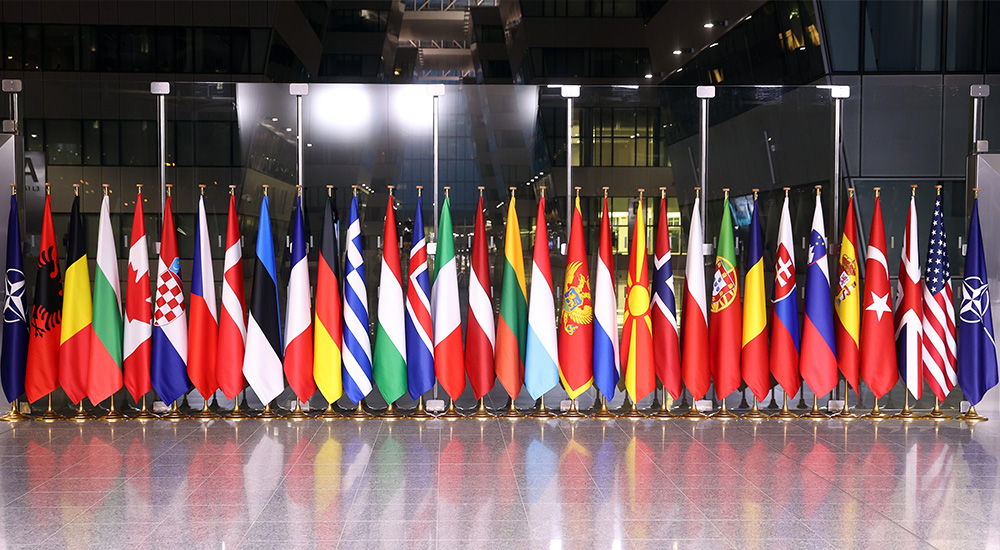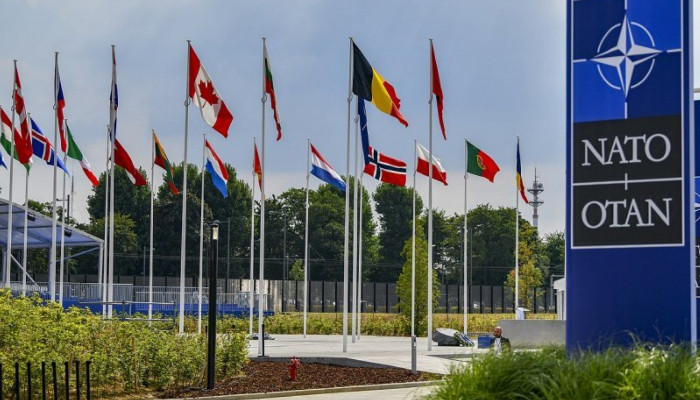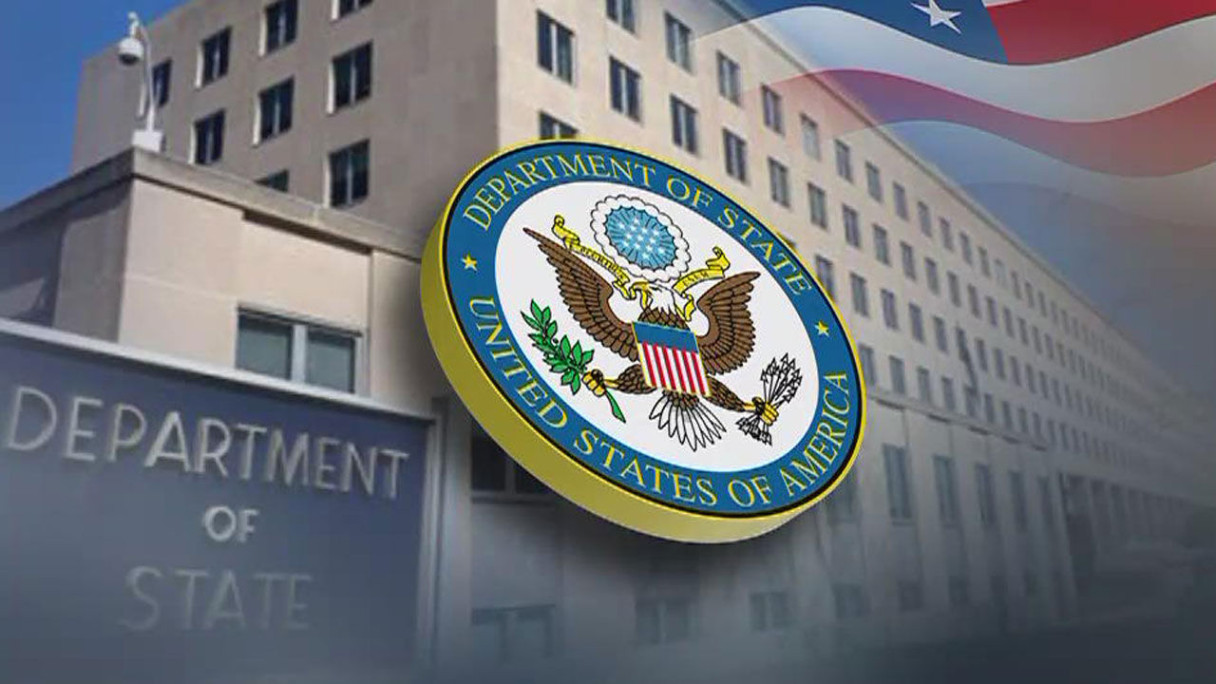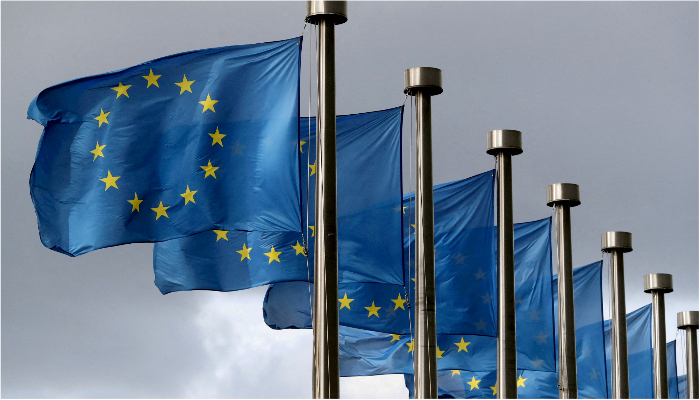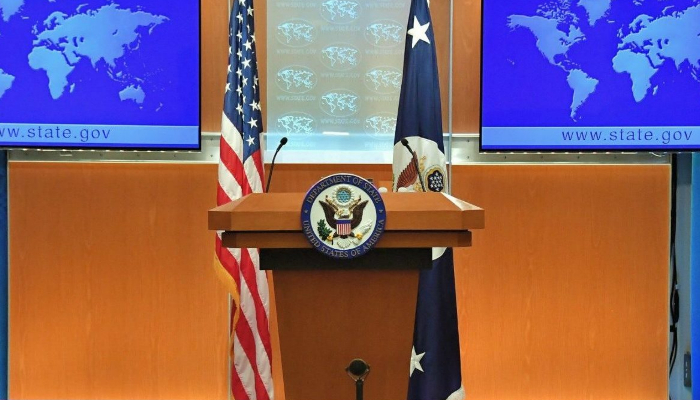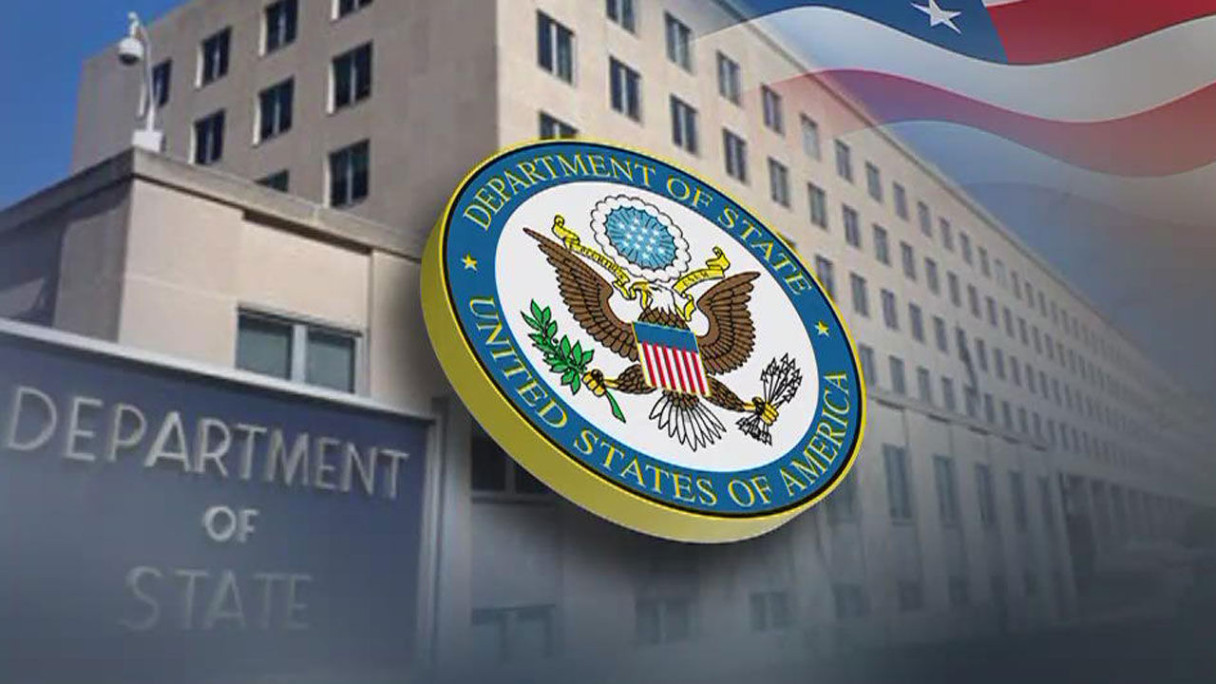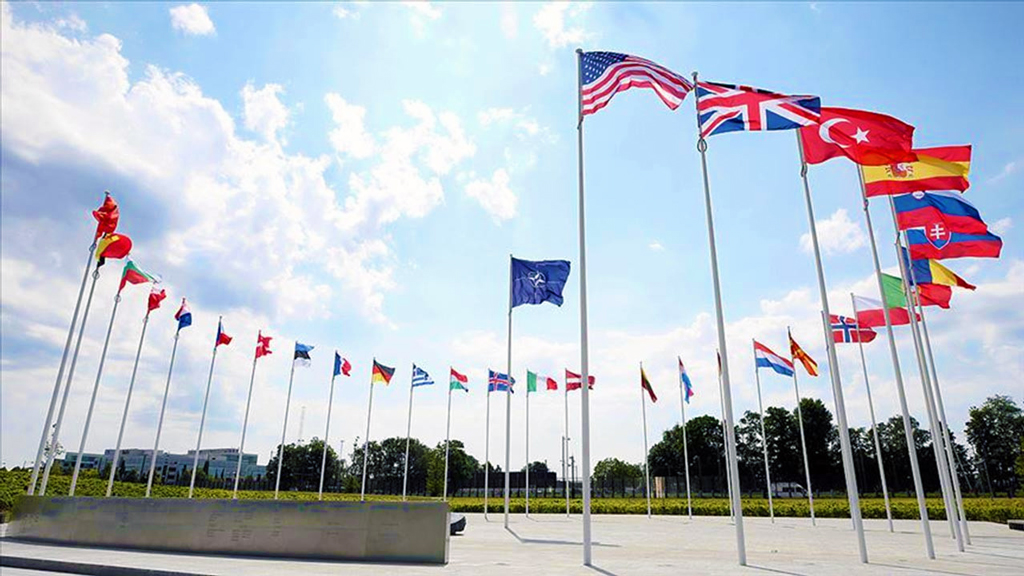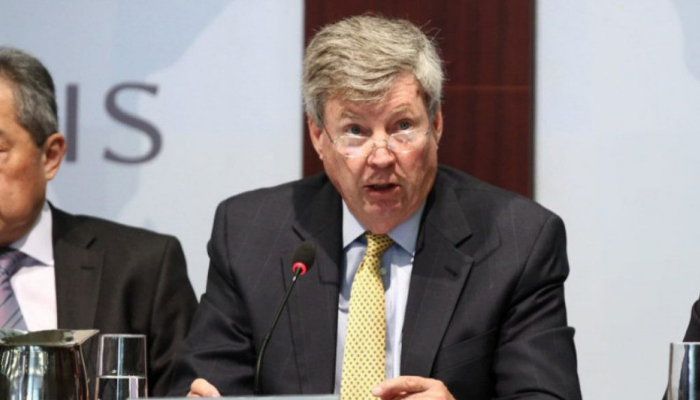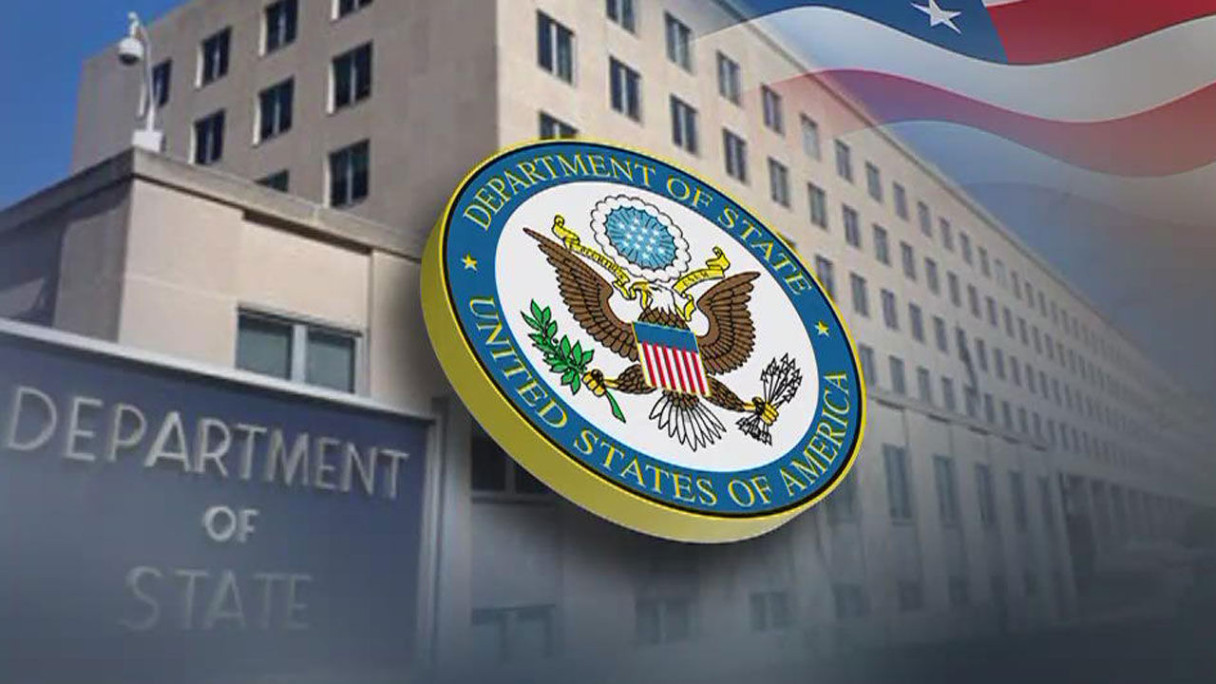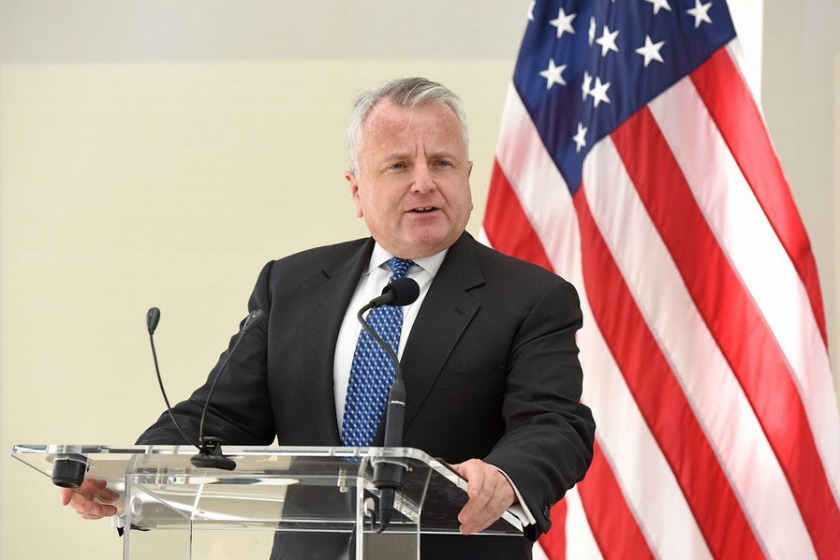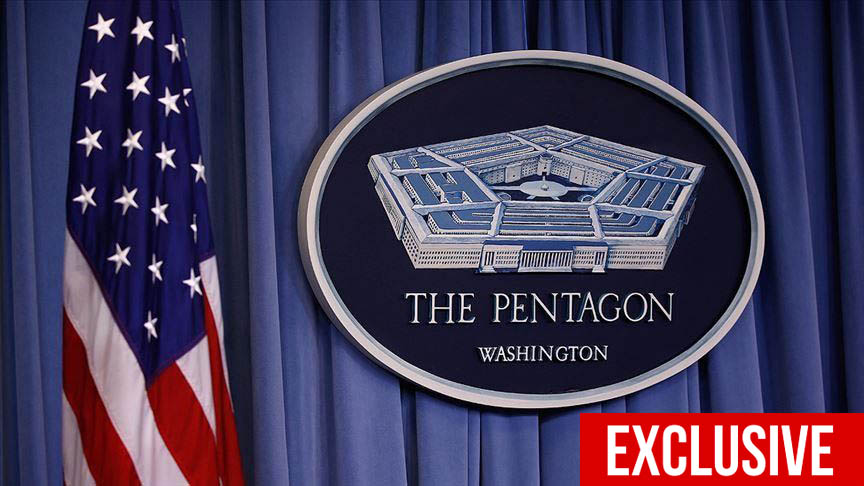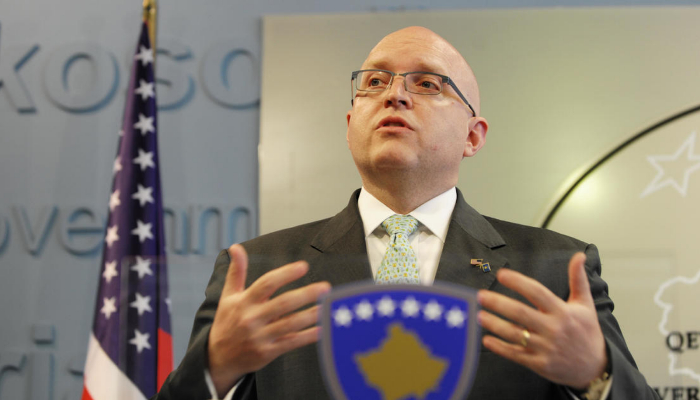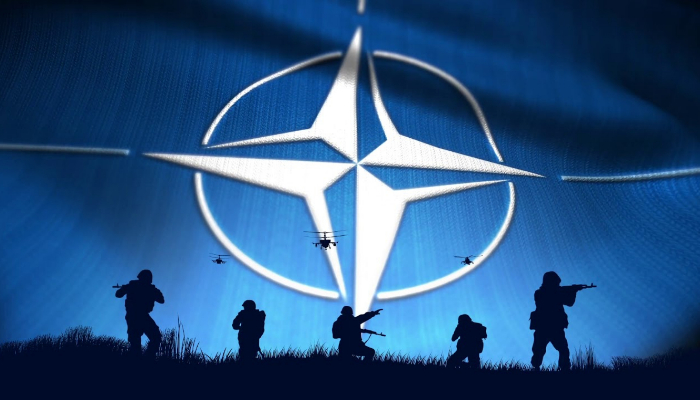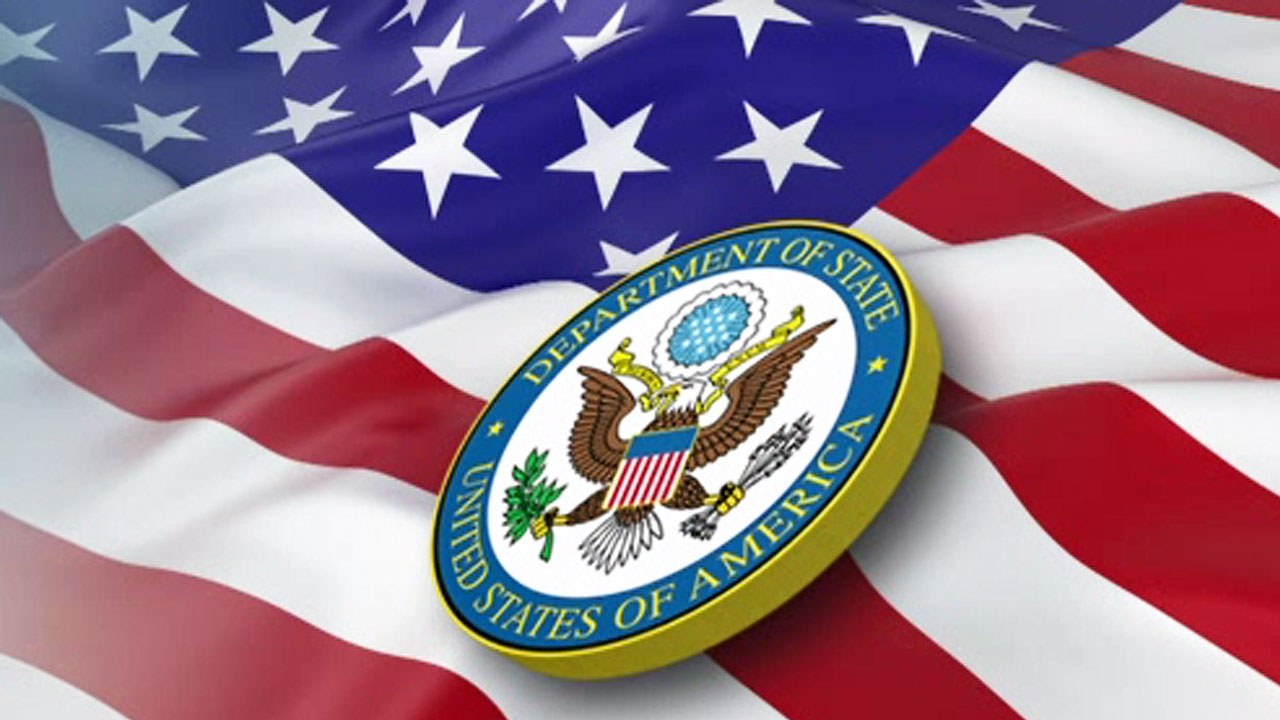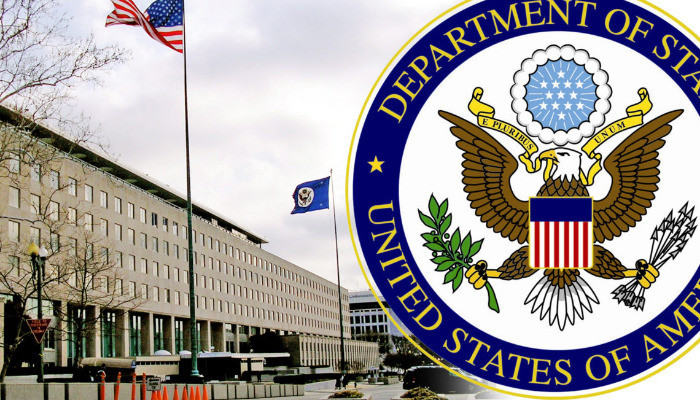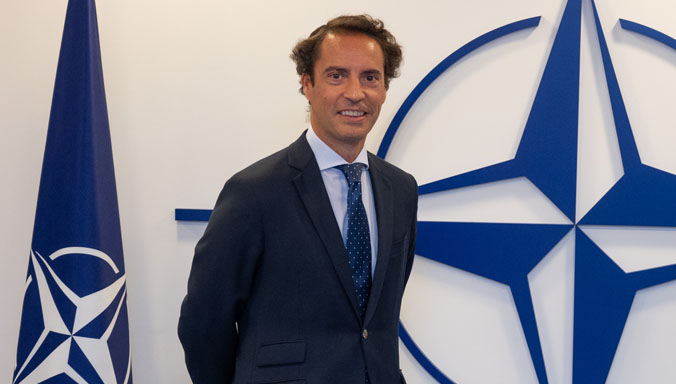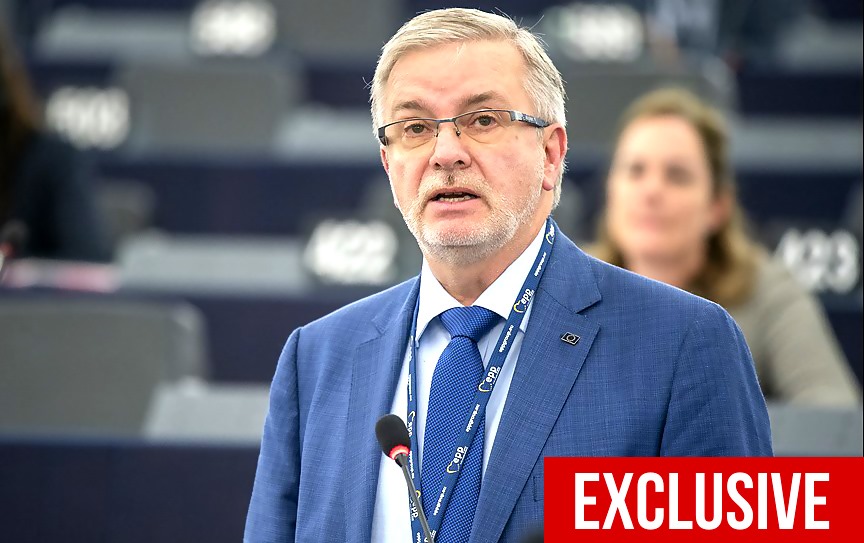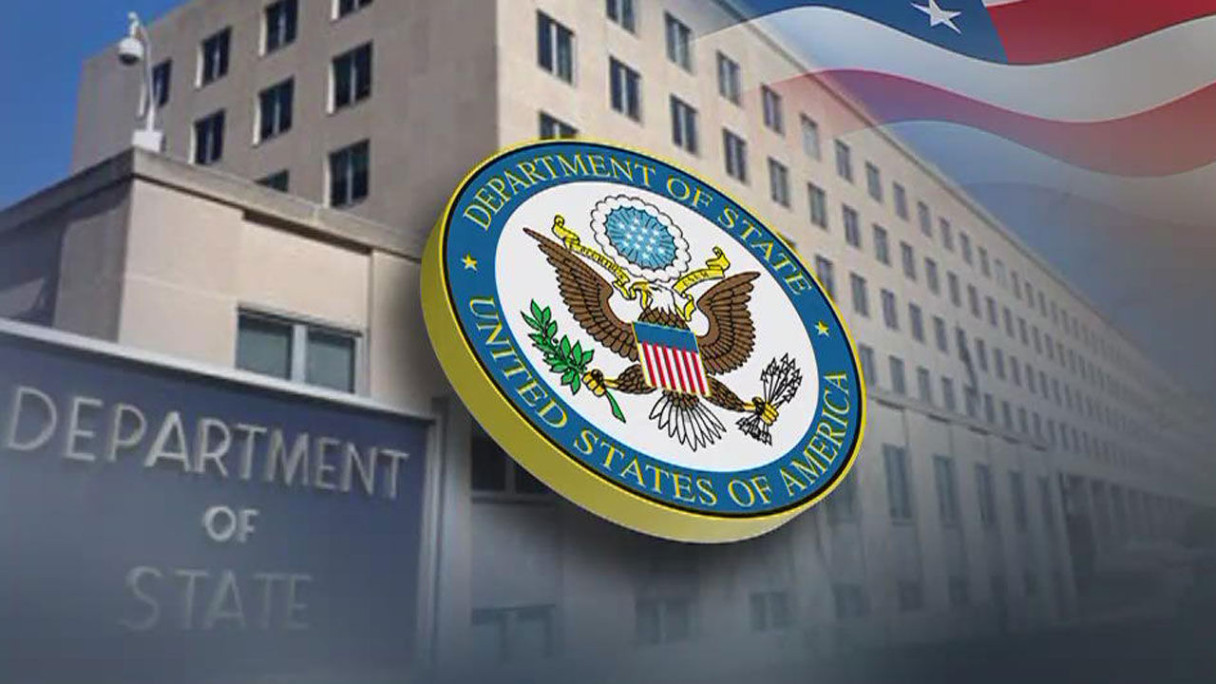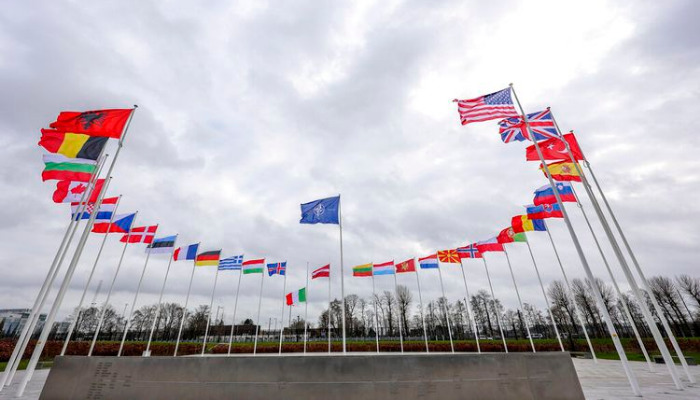Analytics
NATO: We welcome the development of infrastructure of strategic importance, such as the port facilities on the Black Sea coast
„We welcome all steps undertaken by the Georgian authorities to promote its economic development and security. According to a NATO official speaking to Europetime, this includes the development of infrastructure of strategic importance, such as the port facilities on the Black Sea coast. „NATO’s partnership with Georgia is on a solid track. The foreign ministers of Georgia, Bosnia and Herzegovina and Moldova attended the meeting of NATO Foreign Ministers in Bucharest at the end of November. These three countries are facing Russian pressure and NATO is committed to do even more to help strengthen their resilience and capabilities to defend themselves. For Georgia, we are committed to increasing our support by building on the Substantial NATO-Georgia Package, including in the areas of situational awareness, secure communications, resilience and cyber, as well as by helping Georgia to develop its own cyber capabilities and by providing additional personnel to the NATO Liaison Office in Georgia“, a NATO official told Europetime. Prime Minister Irakli Garibashvili revealed on 12 December that the long-awaited deep sea port of Anaklia will be built with the government’s participation, which will subsequently own 51% of it. The Prime Minister noted that an international competition will be announced to select the partners and companies which will participate in the project.
NATO: We welcome all steps undertaken by the Georgian authorities to promote its economic development and security. Putin’s energy leverage is weakening
`We welcome all steps undertaken by the Georgian authorities to promote its economic development and security. This includes the development of infrastructure of strategic importance, such as the port facilities on the Black Sea coast“, - According to a NATO official speaking to Europetime, NATO’s partnership with Georgia is on a solid track. „I can add the following. NATO’s partnership with Georgia is on a solid track. The foreign ministers of Georgia, Bosnia and Herzegovina and Moldova attended the meeting of NATO Foreign Ministers in Bucharest at the end of November. These three countries are facing Russian pressure and NATO is committed to do even more to help strengthen their resilience and capabilities to defend themselves. For Georgia, we are committed to increasing our support by building on the Substantial NATO-Georgia Package, including in the areas of situational awareness, secure communications, resilience and cyber, as well as by helping Georgia to develop its own cyber capabilities and by providing additional personnel to the NATO Liaison Office in Georgia. Furthermore, for too long, Europeans have been dependent on Russian oil and gas. Russia has weaponised energy and tried to use it to blackmail us, and prevent us from supporting Ukraine, but President Putin has not succeeded. Allies are taking extraordinary steps to decrease energy use and diversify energy supplies. Storage sites for gas in Europe are at capacity. Allies are securing liquefied natural gas contracts, prolonging nuclear reactors and restarting coal-fired plants. Russia now provides less than 10 percent of Europe’s gas, down from 45 percent before the war. This represent a buffer against further cut-offs of Russian supplies or other shocks. The G7 also agreed to cap the price for Russian oil, further limiting the revenues that fund the Kremlin's war, and Allies will continue to invest in stable and reliable energy supply, suppliers, and sources. So President Putin’s energy leverage is weakening“, - a NATO official told Europetime. The leaders of Azerbaijan, Georgia, Hungary, and Romania signed an agreement in Bucharest on Saturday to build an underwater electric cable under the Black Sea. The project could become a new power source for the European Union as the bloc seeks to reduce its reliance on Russian energy. "Since the beginning of the Russian war, we have decided to abandon Russian fossil fuel and diversify our options towards reliable partners in the energy field, such as those present at this table. And it is working," said Ursula von der Leyen, president of the European Commission. The 1,100-kilometer cable from Azerbaijan to Romania will provide Azeri energy for the rest of the continent. It will also benefit Moldovans and Ukrainians, who have seen their energy security compromised by Russia's supply cuts and the bombing of critical infrastructure. The project could be completed within three to four years. As explained by Azerbaijani President Ilham Aliyev, the Asian country currently produces 27 gigawatts of wind and solar power and is developing projects that should increase this capacity by 4 gigawatts by the end of 2027. "It is a step towards creating a corridor for green energy," said the president of the natural gas-extracting country.
The US supports the Black Sea electricity project
The United States supports the December 17 Memorandum of Understanding signed between the leaders of Georgia, Azerbaijan, Romania, and Hungary for the development of a 1,100-kilometer subsea electricity cable to transport clean energy from the South Caucasus to the European Union via the Black Sea. a State Department spokesperson told Europetime. „As the President of the European Commission Ursula von der Leyen said during her address at the signing ceremony, the agreement will “bring the European Union closer to our partners in the South Caucasus region, and it will help both regions achieve the clean energy transition.” We also look forward to the results of the World Bank feasibility study that is now ongoing. On Georgia’s role in the project, we refer you to the Government of Georgia“, - a State Department spokesperson told Europetime. The leaders of Azerbaijan, Georgia, Hungary, and Romania signed an agreement in Bucharest on Saturday to build an underwater electric cable under the Black Sea. The project could become a new power source for the European Union as the bloc seeks to reduce its reliance on Russian energy. "Since the beginning of the Russian war, we have decided to abandon Russian fossil fuel and diversify our options towards reliable partners in the energy field, such as those present at this table. And it is working," said Ursula von der Leyen, president of the European Commission. The 1,100-kilometer cable from Azerbaijan to Romania will provide Azeri energy for the rest of the continent. It will also benefit Moldovans and Ukrainians, who have seen their energy security compromised by Russia's supply cuts and the bombing of critical infrastructure. The project could be completed within three to four years. As explained by Azerbaijani President Ilham Aliyev, the Asian country currently produces 27 gigawatts of wind and solar power and is developing projects that should increase this capacity by 4 gigawatts by the end of 2027. "It is a step towards creating a corridor for green energy," said the president of the natural gas-extracting country.
The EU says it is now in the hands of Georgia to do what’s necessary in order to advance on its European path
Georgia is a European state committed to respecting and promoting the values on which the European Union is founded, an EU spokesperson told Europetime. „The Council, following the Commission’s Opinion’s, has given Georgia the perspective to become a member of the European Union. The Council, following the Commission’s opinion’s, has also recommended candidate status to Georgia once a certain number of priorities will have been addressed. It is now in the hands of Georgia to do what’s necessary to take the next step in the process, in order to advance on its European path. This is well within its reach. The to-do list is clear and the EU stands ready to advise and support Georgia (as always) in this process. To complete the Opinions, an analytical report will be published before the end of the year to give a more detailed analysis on the situation of the three countries regarding the acquis. From 2023, Commission’s yearly enlargement package will include the three countries, and will report on their progress regarding the priorities defined in the Opinion. The European Union stands by Georgia now, as it has done throughout the years since independence. We consistently invest in Georgia’s democracy and in Georgia’s economy as friends and partners“, - said an EU spokesperson. European Council grants candidate status to Ukraine and Moldova, recognises Georgia’s “European perspective”. Charles Michel, the President of the European Council, said that the EU was ready to grant the same status to Georgia once the outstanding priorities outlined by the European Commission were addressed by the Georgian government.
State Department: Our position on Abkhazia and South Ossetia remains clear: these regions are integral parts of Georgia
The State Department comments on the EU ambassadors' agreement. „Our position on Abkhazia and South Ossetia remains clear: these regions are integral parts of Georgia. Russia’s sham referenda and annexation efforts in Ukraine are an affront to the principles of sovereignty and territorial integrity that underpin international peace and wellbeing. The United States will never recognize Russia’s purported annexation of any territory it illegally seized from Ukraine. Any such territory remains part of Ukraine“, - a State Department spokesperson told Europetime. EU ambassadors today agreed a mandate for negotiations with the European Parliament on a decision on the non-acceptance of Russian travel documents issued in Ukraine and Georgia. This decision is a response to Russia’s unprovoked and unjustified military aggression against Ukraine and Russia’s practice of issuing Russian international passports to residents of the occupied regions. It also follows Russia’s unilateral decision to recognise the independence of the Georgian territories of Abkhazia and South Ossetia in 2008. Russian travel documents issued in, or to persons resident in, Russian-occupied regions in Ukraine or breakaway territories in Georgia will not be accepted as valid travel documents for obtaining a visa or crossing the borders of the Schengen area. „With its illegal annexation of Ukrainian regions Russia has once again shown its blatant disregard for the rules-based international order. We will never recognise the violation of Ukraine and Georgia’s fundamental rights to independence, sovereignty and territorial integrity. The EU stands united and resolutely with both countries and their people. Vít Rakušan, Minister of the Interior of Czech Republic Russian travel documents issued in these regions are already not recognised, or in the process of not being recognised, by EU member states. This decision aims to set out a common approach, ensure the proper functioning of the external border and common visa policies and safeguard the security of EU member states. Next steps On the basis of this mandate, the presidency is ready to start discussions with the European Parliament. Background Since the illegal annexation of the Crimean peninsula in March 2014, Russia has issued Russian international passports to residents of Crimea. That practice was extended to the non-government-controlled areas of Donetsk and Luhansk in April 2019, followed by the Kherson and Zaporizhzhia occupied regions in July 2022. The systematic issuance of Russian passports in those occupied regions constitutes a further infringement of international law and Ukraine’s territorial integrity, sovereignty and independence. The EU has repeatedly condemned in the strongest possible terms Russia’s military actions in Ukraine and expressed full solidarity with the people of Ukraine. EU member states have firmly rejected and unequivocally condemned the illegal annexation by Russia of Ukrainian regions and territories, as well as Russia’s recognition of the independence of the Georgian territories of Abkhazia and South Ossetia. In reaction to the Russian annexation of Crimea and the most recent developments in Russia’s war of aggression against Ukraine, a series of individual and economic sanctions have been introduced. The EU has also fully suspended the visa facilitation agreement between the EU and Russia.
State Department: Georgia remains a vital strategic partner in the region
The State Department comments on the Under Secretary's visit to Georgia. According to a State Department spokesperson speaking to ET, Georgia remains a vital strategic partner in the region. „The Under Secretary thanks the Georgian government and people for their collaboration to date. During her trip, she is meeting with Georgian leaders to reiterate the United States’ continued support of Georgia’s Euro-Atlantic aspirations. Georgia remains a vital strategic partner in the region, and we look forward to continued collaboration, including in export control and border security. As the Under Secretary said in her remarks on Thursday (10/6), the United States remains steadfast in its support for Georgia’s sovereignty and territorial integrity within its internationally recognized borders“, - a State Department spokesperson said. Undersecretary Jenkins visited Tbilisi on October 5-7 to attend the Biosafety Association for Central Asia and the Caucasus (BACAC) Regional Conference in Tbilisi. After addressing the conference, she told reporters that when she meets with members of the Georgian government, she will deliver „a message of strong support from Washington for the tremendous work Ambassador Degnan and her Embassy team have done to help advance Georgia’s Euro-Atlantic aspirations“.
NATO: Russia must reverse its recognition of Abkhazia and South Ossetia, and it must withdraw its forces from these regions of Georgia
Russia must reverse its recognition of Abkhazia and South Ossetia, and it must withdraw its forces from these regions of Georgia. According to a NATO official speaking to ET, NATO condemns the grave human rights violations taking place in these regions. NATO’s message is clear and consistent: we fully support the sovereignty and territorial integrity of Georgia within its internationally recognised borders. Russia must reverse its recognition of Abkhazia and South Ossetia and it must withdraw its forces from these regions of Georgia. We condemn the grave human rights violations taking place in these regions – as well as the construction of barbed wire fences along the administrative boundary line. We will also continue to support Georgia, as it improves its ability to defend itself“, - a NATO official says. Belarus President Alexander Lukashenko arrived in occupied Abkhazia and met with its de facto leader Aslan Bzhania in Bichvinta on September 28. Georgian Foreign Ministry summoned the Ambassador of Belarus to Georgia following the visit. The ministry demanded that Belarus respect the sovereignty and territorial integrity of Georgia within its internationally-recognized borders and not take actions that contradict the fundamental principles of international law. The president of Georgia accused Lukashenko of violating bilateral relations and international law by visiting Abkhazia. Asked about Lukashenka’s visit to Abkhazia during a 28 September briefing, U.S. State Department Spokesperson Ned Price reiterated the U.S. steadfast support for Georgia and its territorial integrity. Russia recognised the `independence` of the two regions on August 26, 2008, following the five-day Russia-Georgia war. Belarus does not recognize the independence of occupied Abkhazia. The Ambassador of the European Union to Georgia, Pawel Herczynski, stated that Lukashenko is not a legitimate President of Belarus.
William Courtney: Lukashenko is under increasing pressure from Moscow and may be more willing to do its bidding
William Courtney, adjunct senior fellow at RAND Corporation and former U.S. ambassador to Georgia and Kazakhstan, discusses Belarus President Alexander Lukashenko's "visit" in occupied Abkhazia. Speaking to ET, William Courtney noted that Lukashenko is under increasing pressure from Moscow and may be more willing to do its bidding. „One cannot be sure of the reason, but the visit is likely not accidental. Lukashenko is under increasing pressure from Moscow and may be more willing to do its bidding. At present, Moscow seems frustrated that Abkhazia acts somewhat independently. So the Kremlin might think that if Abkhazia joins the Union States, it will have more ways to lean on Belarus to follow its guidance“, William Courtney said. Belarus President Alexander Lukashenko arrived in occupied Abkhazia and met with its de facto leader Aslan Bzhania in Bichvinta on September 28. Georgian Foreign Ministry summoned the Ambassador of Belarus to Georgia following the visit. The ministry demanded that Belarus respect the sovereignty and territorial integrity of Georgia within its internationally-recognized borders and not take actions that contradict the fundamental principles of international law. The president of Georgia accused Lukashenko of violating bilateral relations and international law by visiting Abkhazia. Asked about Lukashenka’s visit to Abkhazia during a 28 September briefing, U.S. State Department Spokesperson Ned Price reiterated the U.S. steadfast support for Georgia and its territorial integrity. Russia recognised the `independence` of the two regions on August 26, 2008, following the five-day Russia-Georgia war. Belarus does not recognize the independence of occupied Abkhazia. The Ambassador of the European Union to Georgia, Pawel Herczynski, stated that Lukashenko is not a legitimate President of Belarus.
State Department about the mass influx of Russian citizens: It is the Government of Georgia’s sovereign decision regarding who to admit
State Department comments on mass influx of Russian citizens through the Russo-Georgian Larsi border checkpoint. Regarding the large influx of Russian citizens, the State Department stated that the Georgian government had sole discretion over who to admit. According to a State Department spokesperson speaking to Europetime, „It is the Government of Georgia’s sovereign decision regarding who to admit, as they work to strike the delicate balance between security and openness“. A reminder that the U.S. Permanent Representative to the Organization for Security and Cooperation in Europe (OSCE) also comments on the issue. He says that each country is going to be different in terms of how it responds to the desire by Russian citizens to escape their country and to seek refuge elsewhere, and each country has to decide based on what it feels is best to protect its national security. Of course Russia continues today to occupy 20 percent of sovereign Georgian territory, and that is a huge concern. Russia never implemented the terms of the six-point ceasefire from August 2008, and has continued to maintain military forces in Tskhinvali region and in Abkhazia in contravention of that agreement and in contravention of Georgia’s sovereignty and territorial integrity. So I appreciate the concern that many Georgians have over this massive influx of Russian citizens, and all I can say is that this is a sovereign decision for the Government of Georgia on who to admit and in what types of numbers. But certainly, this is an unprecedented situation that your country faces right now where not only are two regions of your country occupied illegally by Russia, but you have a huge influx of primarily young men coming from Russia as a result of this mobilization order. And so each country is going to be different in terms of how it responds to the desire by Russian citizens to escape their country and to seek refuge elsewhere, and each country has to decide based on what it feels is best to protect its national security. Following Russian President Vladimir Putin's order for a partial military mobilization on September 21, it was seen that long queues of people were trying to enter Georgia through the Russo-Georgian Larsi border checkpoint.
Ambassador John Sullivan: We will await what the Russian Government’s reaction and then I would expect that there would be a phone conversation, or perhaps a meeting
What are the next steps diplomatically? Secretary Blinken said he expects to speak to Foreign Minister Lavrov in the coming days and is ready to discuss new steps. What should be these steps? The question of the Europe Time was answered by John J. Sullivan, U.S. Ambassador to the Russian Federation. „Well, we will await the Russian Government’s response to the written document that I delivered on Wednesday. The Russian Government also received from NATO a written response from NATO to the draft treaty that Russia presented in mid-December through us, through the United States when Assistant Secretary Donfried and I met with Deputy Foreign Minister Ryabkov. So we will await what the Russian Government’s reaction and assessment is to our written responses, and then as Secretary Blinken noted, I would expect that there would be a discussion, a phone conversation, or perhaps a meeting – I don’t know; that hasn’t been agreed to. The Secretary, Secretary Blinken, has used both formats to communicate with the foreign minister, many phone calls and a number of meetings over the last year. So I wouldn’t be surprised if that happened in relatively short order, but that depends on the Russian Government, its response to the documents that the United States and NATO submitted and when they would like to resume discussions. We certainly hope that they will do so. As I said at the outset, our preferred path is diplomacy and we believe the document that we submitted on Wednesday lays out a path to diplomacy and a de-escalation of this situation“, - Ambassador John J. Sullivan said.
Pentagon says the delivery of 26 tons of security assistance to Georgia enhances the capabilities of the country
According to a Department of Defense spokesman speaking to Europetime, the delivery of 26 tons of security assistance to Georgia enhances the capabilities of the country. „The delivery of 26 tons of security assistance to primarily Building Partner Capacity Section 333 Program (10 USC $ 333) funded assistance. There were no significant new capabilities as part of this package. The Building Partner Capacity Section 333 Program has long served to build partnerships with foreign nations by providing military and equipment training to enhance partner nations' capabilities“, - Pentagon says. Georgia receives $11.5 million in equipment from the US. According to the US Embassy in Georgia, 26 tons of security assistance were handed over to the Defense Forces of Georgia. „Today we delivered 26 tons of security assistance to enhance the defensive capabilities of Georgian Defense Forces. This $11.5 million in equipment, is just one way the U.S. supports our strategic partnership with Georgia“, - the statement reads.
State Department on Reeker's visit: The United States is committed to promoting a democratic and peaceful future for the South Caucasus region
Ambassador Reeker, who was recently named Senior Advisor for Caucasus Negotiations, is currently in Baku where he met on Tuesday, September 13 and Wednesday, September 14 with senior Azerbaijani leaders. Ambassador Reeker met with President Aliyev on Tuesday. According to a State Department spokesperson speaking to Europetime, In all locations, Ambassador Reeker will emphasize that the United States is committed to promoting a secure, stable, democratic, prosperous, and peaceful future for the South Caucasus region. In all 3 countries, Ambassador Reeker is meeting with senior officials to discuss key issues in the region as well as look at pathways to assist partners in engaging directly and constructively to resolve outstanding issues and further regional cooperation. In all locations, Ambassador Reeker will emphasize that the United States is committed to promoting a secure, stable, democratic, prosperous, and peaceful future for the South Caucasus region. On August 24, U.S. Secretary of State Antony Blinken appointed Reeker the country’s Senior Advisor for Caucasus Negotiations. US State Department Principal Deputy Spokesperson Vedant Patel said at a press briefing on September 7 that Reeker will conduct his first visit in this new capacity to the region. „ambassador Reeker, our senior advisor for Caucasus negotiations, will be traveling to the region this week in what will be his first trip in this new role. This is a first of what we expect to be regular travel to the region. He departs this evening and will be going to Armenia, Georgia, and Azerbaijan, and in all three countries he’ll meet with senior officials to discuss key issues in the region as well as looking for pathways to assist partners and engaging directly and constructively to resolve outstanding issues and further regional cooperation“, - Patel said.
NATO: LANDCOM officers' visit to Georgia concluded with the signature of a formal agreement by both parties
LANDCOM officers conducted an Operational Capabilities Concept (OCC) Advisory Visit (AV) in Georgia (GEO) for their upcoming NATO Led Evaluation, Level 2 (NEL2) happening now. This visit is part of a robust and long standing relationship between LANDCOM and Georgia Land Forces. According to a NATO official speaking to Europetime, NATO Land Component Command (LANDCOM) provided three officers to conduct an advisory visit to Georgia and the visit concluded with the signature of a formal agreement by both parties. NATO Land Component Command (LANDCOM) provided 3 officers to conduct an advisory visit to Georgia, in preparation for the upcoming second level of the NATO Led Evaluation process (called NEL2) aimed at determining the level of operational capability of a light infantry company from Georgia, which is also listed for NATO's Response Force. The visit occurred from 22 to 26 August 2022. It featured a series of briefings and meetings - including with the Georgian Deputy Chief of Defence - and activities. The visit concluded with the signature of a formal agreement by both parties over a set of Performance Measures against which the second phase of the mentioned evaluation process will be based“, - NATO official said. According to NATO Georgia is a prioritised NATO partner with an infantry company listed for NATO’s Response Forces (NRF).
The United States is working with NATO allies to support Georgia’s security and defense modernization efforts
EXCLUSIVE According to a State Department spokesperson U.S. security assistance to Georgia has focused on capabilities that improve defense modernization. `Georgia is a highly valued U.S. and NATO partner. The United States strongly supports Georgia’s NATO aspirations and is working with NATO Allies to support its security and defense modernization efforts. The United States also held Bilateral Defense Consultations with Georgia on May 20. „The Georgia Defense and Deterrence Enhancement Initiative (GDDEI) is a formal bilateral effort by the United States and Georgia to continue their strong military-to-military relationship and builds upon the success of the Georgia Defense Readiness Program (GDRP). GDDEI builds on the progress achieved under GDRP by enhancing deterrence and territorial defense capabilities, fostering interoperability with NATO, and enabling institutional reform and modernization through organizational change management“, - a State Department spokesperson said. U.S. Department of State: Security assistance to Georgia has focused on capabilities that enhance defense modernization and reforms
U.S. Department of State: Security assistance to Georgia has focused on capabilities that enhance defense modernization and reforms
Pending Congressional clearance, the Department of State intends to provide $35 million in new FY 2022 Foreign Military Financing (FMF). This is the same amount of bilateral FMF Georgia received in FY 2021. As a State Department spokesperson told Europetime, U.S. security assistance to Georgia has focused on capabilities that improve defense modernization. `U.S. security assistance to Georgia has focused on capabilities that enhance defense modernization and reforms that 1) provide Georgia increased capabilities and capacity to defend its territory and sovereignty, 2) improve training and professionalization, 3) help Georgian forces to work together more effectively with NATO, 4) strengthen maritime domain awareness, and 5) support Georgian participation in coalition operations (of note, Georgia was the largest non-NATO troop contributor to the Resolute Support Mission in Afghanistan through the 2021 drawdown). These funds will continue to build upon our steadfast security cooperation`, - a State Department spokesperson said. Georgia has received over $400 million in FMF since 1997.
Javier Colomina: We are currently discussing what the tailored support should entail for Georgia and we expect them to be adopted at the Madrid Summit
NATO Secretary General’s Special Representative for the Caucasus and Central Asia, Deputy Assistant Secretary General for Political Affairs and Security Policy, Javier Colomina, answered questions by Europetime about the NATO Summit, NATO-Georgia relations, the Russian war in Ukraine, the accession process of Finland and Sweden, as well as other topical issues. ET: What is your opinion on the implications of Russia’s invasion of Ukraine for NATO? In the long run, how do you view these consequences, and how do you see the alliance's relations with Russia in general? Russia’s aggression against Ukraine represents the gravest threat to Euro-Atlantic security in decades. It has shattered peace in Europe and is causing enormous human suffering and destruction. We see President Putin concentrating his forces in eastern Ukraine after his failed offensive against Kyiv. Russia is now engaged in a war of attrition, with high numbers of casualties on both sides. The Russian military has resorted to indiscriminate levelling of Ukrainian cities. Schools, hospitals, and residential areas have been flattened and the humanitarian conditions in Russian-controlled areas are dire. Furthermore, President Putin’s war is driving up food prices, pushing people into poverty and destabilising entire regions. This is cynical and destructive and the costs are being borne by the world’s most vulnerable people. We call on Russia to immediately end its blockade of Ukrainian ports; and Allies are working hard, also with the United Nations, to find solutions. Against this background, NATO continues to pursue two parallel priorities. First, we continue to support Ukraine. On the other, we are making sure that this war does not escalate further into Allied territory, while we keep protecting one billion of our citizens living in NATO countries. NATO Allies have provided support for Ukraine for many years, including with equipment, financial support, and training for tens of thousands of Ukrainian troops. Allies and partners have already provided Ukraine with billions of dollars’ worth of lethal and non-lethal equipment, as well as humanitarian aid. All of this is making a difference on the battlefield, helping Ukraine to uphold its right of self-defence, which is enshrined in the United Nations Charter. Allies are also providing substantial humanitarian aid, including by hosting millions of refugees. They are now stepping up further, with many types of light and heavy military equipment. Secondly, we reacted to Russia’s invasion of Ukraine with speed and unity, to protect our nations. Over 40,000 troops are now under direct NATO command, backed by major air and naval power. This is to deter further Russian aggression, in other words, aimed not at provoking a conflict, but rather at preventing it and restoring peace. We continue to call on President Putin to stop his war in Ukraine, withdraw his troops and engage in good faith in the diplomatic process. Our relationship with Russia is at its lowest point since the Cold War. We regret this, and it is not of our choosing. Our relationship with Russia was not always like this. The fall of the Berlin Wall ushered a new era of partnership with Russia. For many years, we would discuss our common security in the NATO-Russia Council. We cooperated in areas of common interest, from counter-terrorism to arms control, and we worked closely together in Afghanistan. Russia chose to walk away from this partnership. The war in Ukraine is part of a long pattern of Russia using military force to achieve its political aims, as Georgians are well aware. ET: As for the status of NATO-Georgia relations and implications of Russia’s invasion of Ukraine, what are the fundamental pillars that the Alliance will use to make future decisions? Has anything fundamentally changed? First of all, the current security environment makes NATO’s partnership with Georgia even stronger and closer. We intensified our dialogue in recent months: Foreign Minister Darchiashvili and Defence Minister Burchuladze participated in various meetings with their NATO counterparts; Prime Minister Garibashvili met with the NATO Secretary General last May; and I visited the South Caucasus last April. We also maintain a strong level of practical cooperation, with the third NATO-Georgia Joint Exercise last March, and many other ongoing activities under the umbrella of the Substantial NATO-Georgia Package. Against the backdrop of Russia’s unlawful invasion of Ukraine and of its security implications, including for the Black Sea region, Allies have agreed to step up the scope of practical assistance to Georgia. We are currently discussing what this should entail and I expect that more details will be unveiled at the NATO Summit in Madrid next week. The Georgian government has clearly stated that integration into NATO continues to be a top foreign policy and security objective for the country. This also means that, as I have said at other times, we expect Georgia to redouble its efforts in key reform areas such as the judiciary, media freedom and accountability of the security sector. On our side we stand by our commitments from the 2008 Bucharest Summit on Georgia’s aspirations towards NATO membership. Our support for Georgia’s sovereignty and territorial integrity - within international recognized boundaries - remains unwavering. We also continue to recognize Georgia’s contribution to our shared security. Georgia has been one of the largest contributors to our missions in Afghanistan and played an important role in the evacuation efforts in Summer 2021. Georgia also participates in the NATO Response Force; and it has recently led a NATO-Georgia exercise, which involved around 600 troops. ET: What system or tool may be put in place to provide tailored support to Georgia in the face of heightened threats? How might the Alliance aim to continue its cooperation with Georgia at a new stage, possibly in a new format? As I mentioned before, in light of the unprovoked Russian invasion of Ukraine, Allies have agreed to step up assistance to partners such as Georgia, which is one of NATO’s closest partners and has been subject to Russian hybrid threats and pressure since many years. Rather than establish new tools or systems, we should build on the Substantial NATO-Georgia Package and increase our support to Georgia by in the areas of situational awareness, secure communications, resilience and cyber. We are currently discussing, together with Georgian authorities, what these measures should entail in more detail and we expect them to be adopted at the Madrid Summit. ET: Can Georgia expect any concrete, tangible results from the next summit? What will be the main focus of the summit, and what could you say about Ukraine? We will take important decisions at the NATO Summit in Madrid next week. We will strengthen our deterrence and defence; we will agree to support Ukraine for the long haul; we will agree NATO’s next Strategic Concept, which represents the blueprint for our future adaptation in an age of increased strategic competition with authoritarian powers like China; and we will agree to support further our partners at risk with tailored measures. We will commit to working even more closely with our partners in the Asia-Pacific and other like-minded partners around the world. We will also review progress on burden-sharing, because it is clear we must continue to invest in our defence, and to invest more and better together in NATO. Only North America and Europe, working together in a strong NATO, can keep our one billion people safe in a more dangerous world. The participation by NATO partners will also be a distinctive feature of our Summit in Madrid. President Zelenskyy has been invited to address NATO leaders at the Madrid Summit and Prime Minister Garibashvili will also be invited to participate in one of the sessions, which shows the importance of our partnership. Invitations to participate have also been extended to Finland, Sweden, and the European Union, as well as to our Asia-Pacific partners Australia, Japan, New Zealand, and the Republic of Korea. ET: What are your thoughts on the prospects for Finland and Sweden joining NATO? How do you think Turkey's concerns may be addressed before the Summit? The applications by Finland and Sweden to join our Alliance are historical. As NATO Secretary General, Jens Stoltenberg said, “They send a clear message: aggression does not pay; intimidation does not work; and NATO’s door remains open.” Finland’s and Sweden’s potential accession to NATO would make both countries safer. It would also make NATO stronger, given that both Finland and Sweden are strong democracies and resilient societies, have considerable military capabilities - including substantial reserves and advanced aircraft and naval forces, all able to work together with NATO – and are long-standing contributors to past and current NATO-led missions (in Afghanistan, in Kosovo, and in Iraq), as well as to NATO and Allied exercises. As the NATO Secretary General said: “We are now considering the next steps on Finland and Sweden’s path to join our Alliance; as we do this, we take into account the security interests of all Allies; when an Ally raises concerns, we address them seriously and we find common ground; so we are now working through Türkiye’s serious security concerns, including on terrorism. Türkiye is an important Ally, with a strategic location, playing a key role in the Black Sea, bordering Syria and Iraq, vital for our fight against ISIS. Türkiye is also the NATO Ally that has suffered more terrorist attacks, including at the hands of the PKK. We are now working together, in a constructive spirit, to find a united way forward. All Allies agree that NATO's door is open, that enlargement has been an historic success, and that we must continue to stand together as we face the greatest security crisis in a generation.” Let me add that from a security perspective, Finland and Sweden are in a better place now than they were before they applied. Many Allies have already made clear commitments to Finland and Sweden’s security; and NATO has increased our presence in the Baltic Sea, including with more exercises; for example, Finland and Sweden have been involved in several Allied exercises in recent weeks, including BALTOPS, bringing together 7,500 personnel from 14 Allies – including from Türkiye. This is a clear demonstration of NATO’s commitment to this region.
MEP Michael Gahler: Reform is a key issue when it comes to the rule of law and the judiciary
EU-Georgian relations and other issues were the topics of the Europe Time interview with MEP Michael Gahler, Group of the European People's Party (Christian Democrats). „We are open and prepared to support a real reform process. There is an ambition in your country to apply for EU membership that must succeed in line with its development, and I am afraid that recent months have not been very helpful in promoting your case. That is why we appeal to the Georgian partners to assess the situation and seek ways forward in the interest of the country. We are trying to defuse tension and get more constructive and cooperative ways to address issues done in Georgia. We encourage all steps in the right direction. We have undertaken enormous efforts to have the European Council three times in the country and through the Eastern Partnership. It is not usual, but we care. We are concerned, but we are also constructive in our approaches“. As for the association trio countries and their ambition, MEP Michael Gahler welcomes their ambitious agenda but stresses the importance of the reform. „We have a comprehensive framework with Georgia and this is an association agreement and deep and comprehensive free trade area which provides a huge spectrum of integration, cooperation, reform, and the reform is the key issue when it comes to rule of law and the Judiciary. And it is extremely important not only in Georgia but also in other countries in this neighborhood", - MEP Michael Gahler said. As for the EU membership perspective, MEP Michael Gahler mentioned that Article 41 says every European country can become a member, but the approach should be for all those who aspire to membership, to simply work on this huge and comprehensive cooperation agenda. So we are supportive, but all reactions in the wrong directions are not helpful so far last month and the last year's continuing confrontation has not been promoting your case. That is why we, friends of Georgia, are appealing to all stakeholders to get this done together. We are friendly partners“, - MEP Michael Gahler said.
The State Department on "3+3" format: Before launching other platforms for discussion, Russia should concentrate on withdrawing its troops from all countries in the region and contributing to peace
As a State Department spokesperson told Europetime, Russia should focus on withdrawing its troops from all countries in the region and contributing to peace before initiating other discussion platforms. „We encourage the countries of the South Caucasus to work together to resolve disputes and to strengthen regional cooperation. While outside actors can play a productive role supporting such efforts, they should not try to impose their own agenda on the region. Russia, which is currently waging a brutal war in Ukraine, has killed thousands and displaced millions more. It should focus on withdrawing its troops - from all countries in the region-and contributing to peace before initiating other discussion platforms“, - a State Department spokesperson told Europetime. The next meeting on the South Caucasus issues in the "3 + 3" format (Azerbaijan, Armenia, Georgia - Russia, Turkey, Iran) will be held in the near future, Russian Foreign Minister Sergei Lavrov said at a press conference after meeting with his Turkish counterpart. "We agreed on how to continue working in the South Caucasus. As you know, a 3 + 3 format was created on the initiative of Turkey. We held the first meeting in Moscow, where Georgian colleagues could not take part, but we emphasize that we will always be happy with their participation. The next meeting is being prepared now, I hope we will be able to announce it in the near future," Lavrov said. Georgia refused to take part in the first meeting, which took place in Moscow on December 10, 2021. EU Spokesperson: We are supporting the three South Caucasus countries, including through the Eastern Partnership Following the Nagorno-Karabakh conflict, which is a landlocked region in southwest Azerbaijan near the southeastern border of Armenia, in 2020 Turkish President Recep Tayyip Erdogan put forward the idea of launching a six-nation platform that includes the cooperation of Turkey, Azerbaijan, Armenia, Georgia, Russia and Iran in order to establish stability and peace in the region. Georgia and Russia suspended their diplomatic ties following the Russia-Georgia war in 2008 when it declared the independence of Georgia’s occupied Abkhazia and Tskhinvali (South Ossetia) region on August 26, 2008.
The Commission has started to work swiftly on the opinion and is now assessing all the replies received to the questionnaire by Georgia
EXCLUSIVE The European Commission has started to work swiftly on the opinion and is now assessing all the replies received to the questionnaire submitted to help prepare the opinion—the first part covering the political and economic situation and the second part the other chapters of the EU acquis. According to a Spokesperson, Ana Pisonero Hernandez, Following the EU membership application submitted by Georgia, the Council has acted swiftly and invited the Commission to submit its Opinion on the application in accordance with the relevant provisions of the Treaties. The Commission will move forward quickly to finalise the Opinion as soon as possible. Decisions on future steps on the EU path will continue to be in the hands of the Member States. As you may have seen, yesterday EU leaders took note of the preparation of the Commission’s Opinions on the application for EU membership of Georgia, Ukraine and the Republic of Moldova, and will return to this matter at their June meeting“, - Spokesperson said.
An official says Javier Colomina’s ongoing visit to Georgia is part of regular consultations held by NATO officials with their Georgian counterparts
A NATO official told Europetime that NATO Special Representative for the Caucasus and Central Asia, Javier Colomina’s ongoing visit to Georgia is part of regular consultations held by NATO officials with their Georgian counterparts. In addition, it is a reflection of the long-standing and solid political and practical partnership developed between NATO and Georgia. „NATO highly values Georgia’s continued contributions to Euro-Atlantic security. During his visit, Mr. Colomina will meet with a wide range of Georgian civilian and military officials, members of Parliament and representatives of the civil society“, - a NATO official told Europetime. Related article A Nato official says NATO highly values Georgia’s long-standing contributions to Euro-Atlantic security


